Mennonite Brethren Collegiate Institute visits Israel-Palestine and Jordan
From Mar. 21 to Apr. 4, 2015, parent and chaperone Sheila Peters and I led a group of 10 Mennonite Brethren Collegiate Institute students on a study tour of the Holy Land. This was my third time in the Holy Land but the first time MBCI has sent a group of students to Israel-Palestine. We visited Jerusalem, Bethlehem, Beit Sahour, Ramallah, Hebron, Nazareth, Ibillin, the Sea of Galilee, the Jordan River, the Dead Sea, Kerak, Petra, Wadi Rum, Madaba and Amman.
Of the 12 nights, students spent four in local homes as guests of Palestinian and Israeli families.
We learned about the region from Mennonite Central Committee partners and we were enriched from walking in the same places where Jesus once walked.
As Christians, we can be tempted to think we have only solutions to offer and nothing to learn from others. But in the Bible, God often offers gifts to the people of Israel (Old Testament) and the church (New Testament) through strangers and outsiders.
Our group from MBCI received many gifts on our travels; here are five:
Receive hospitality.
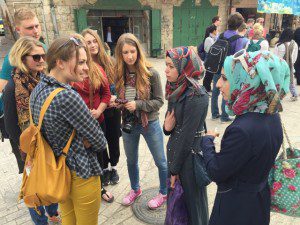
MBCI students on tour in the Holy Land encountered fellow high school students in Hebron. (Hannah Doerksen on left.)
Everywhere we went, we were welcomed. Guides were patient with our questions. Our hosts treated us (and fed us) like royalty. Even people we passed in the street took the time to treat us as friends. In Hebron, we had an impromptu visit with a local high school group we met walking down the street. The time people took to interact with each other made us think of Jesus’ command to love your neighbour (Matthew 22:37–40) – that is, whomever you encounter in your day.
Be not afraid.
News reports try to convince us that the Holy Land is dangerous and scary. But Jesus warns us not to let our lives be controlled by fear. Comparing the news with what we saw walking in the land where he walked helped us understand what Jesus means. Yes, violence does occur, but we never felt unsafe or at risk.
Stand with the poor and powerless.
A traveller who visits religious sites in the Holy Land while ignoring what is going on now has seen nothing. What’s worse, a pilgrim who ignores what settlements and the wall are doing to the people has misunderstood and misrepresented Christ. Jesus stood with the powerless in the first century; those who walk in his footsteps today are called to stand with the victims of injustice now.
Justice doesn’t take sides.
In Ibillin, Father Elias Chacour of the Melkite Greek Catholic Church gave our group an important message: if you come to the Holy Land to be pro-Palestinian and anti-Israeli, go home, for you can’t help. The struggle is to find a way to all live together. Israel must begin to treat Palestinians decently not simply for the sake of the Palestinians, but for the sake of Israel as well.
People matter more than issues.
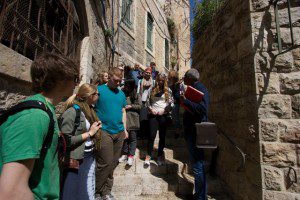
MBCI students on tour to the Holy Land listen to their guide recount history in Jerusalem’s Old City.
We grew angry at the problems we saw, and we longed for solutions that seem far away. However, to focus on issues or “sides” undermines what Christ taught us. Again and again, Jesus demonstrates that people matter more than issues: he heals on the Sabbath, stops the stoning of a woman caught in adultery and speaks to the Samaritan woman at the well. Jesus refuses to let issues or self-righteousness get in the way of seeing each person as worthy of his care.
Look into a mirror, Father Chacour invited us: first by yourself, then with a friend and finally with an enemy. See everyone in that mirror as one created and loved by God.
Therein lies the challenge for all: receive God’s gift of love for us and to others.
—Ramon Rempel, biblical studies teacher, Mennonite Brethren Collegiate Institute
STUDENT REFLECTIONS
What can we do?
MBCI’s newest trip, the Holy Land tour, was two weeks of straight amazement. Expectations were high yet foggy at best, since no one had ever embarked on the same tour in all of MBCI’s history. The distance of the Holy Land was what I think intrigued me; it would undoubtedly be different from my culture. Once we arrived, however, I knew that the trip would be much more to me than a distant vacation from my home and responsibilities.
What struck me most was the openness and genuine hospitality of the Palestinian people. We had the opportunity to stay in the homes of Palestinians, sharing shelter, meals and tales of our lives back home. Anything we asked for, they gave us – so we had to be careful what we mentioned.
Incredibly, our Palestinian hosts were so warm and welcoming, even though their people have had a rough time and still deal with state conflict every day of their lives.
In Ramallah, only a 20-minute drive outside of Jerusalem, checkpoints bar entrance and exit to and from Ramallah, making what should be an easy commute into a two-hour trip. Basic rights such as movement have been taken away from the people there.
The outskirts of Ramallah are bordered by the separation wall – a tall, bleak embodiment of the conflict. The day of our tour of Ramallah was the first time we saw the wall face-to-face. It is hard to express the kind of feeling a wall like that gave me, a free North American. Palestinians call the wall the “Apartheid Wall,” which shows just how serious it is.
We asked every single one of our tour guides what we could do, being high school students from Canada. Each one of them replied that we should educate those around us and raise awareness in our school and communities.
The conflict is convoluted and complex, but we always have hope that what we experienced can be shared and discussed, for it is of the utmost importance as we strive for a world of peace.
—Hannah Doerksen, Grade 12 student
Trip of a lifetime
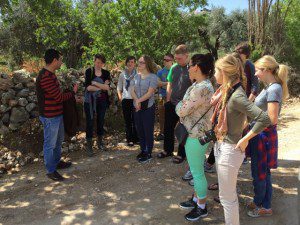
On the outskirts of Ramallah, a local tells MBCI students about lost Palestinian -Arab villages. (Graham Kurbis in sunglasses.)
The Holy Land 2015 trip was extremely special for me. The group, teacher, chaperone and destination created an amazing combination: my two weeks in Israel, Palestine and Jordan were the best of my entire life.
Visiting religious sites, learning about the politics in the area and the situations that local people face everyday made the trip educational, spiritual and extremely fun.
In Jerusalem, we toured the city with Mennonite Central Committee workers who showed us both the major tourist sites and areas tourists often do not see. This included Ramallah (located in the West Bank, only a short distance from Jerusalem) and Lifta, an abandoned Palestinian village dating back to before Christ.
In Ibillin, students of Mar Elias school were gracious enough to invite us to stay with them in their homes for two nights. These homestays let us bond with the students and really get a clear story of the situation in Israel-Palestine. Many of us are still in daily contact with the friends we made.
Beginning with the Dead Sea and finishing in Amman, our experiences in Jordan were extremely fun (floating in the Dead Sea and climbing in Petra) as well as very eye opening and educational (meeting with the MCC workers in Amman).
To sum everything up, the Holy Land 2015 trip was absolutely amazing. Meeting with amazing people, seeing breathtaking views and witnessing the conflict first-hand is something I would do again in a heartbeat. The bonding on the trip created a group of people who I am sure will continue to stay together well after high school.
The trip left nothing to be desired except to spend months in Israel-Palestine rather than weeks.
—Graham Kurbis, Grade 12 student
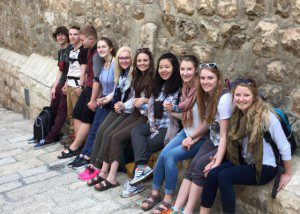
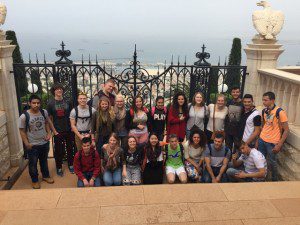
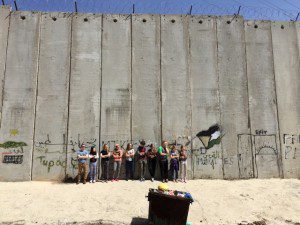
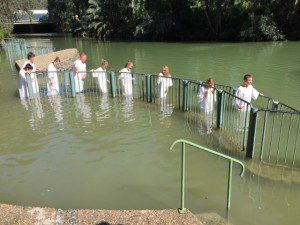
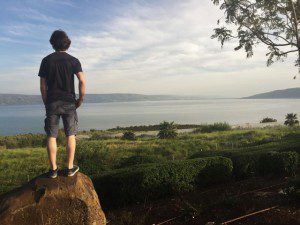



2 comments
As I am nearly 80 years of age, and although I have travelled to many parts of the world (Russia, twice) one of the things left on my bucket list is to travel to Palestine/Israel, although I’m not religious. I appreciate the comments by the students and feel that perhaps their perception of the political situation has probably changed, in favour of the Palestinians. I don’t think you can travel to places like this without absorbing the sense of apartheid. I’ve spent a good deal of time reading the history of the area, mostly from Jewish writers who no longer trust the Jewish historical narrative — Pappe, Nathan Finklestein, etc. as well as the two volume history by Sacher, films by Allison Weir — so am somewhat aware of the real politics. I also get a daily paper, the Times of Israel, and a weekly write-up by Jonathan Cook who lives in Nazareth.
I don’t believe that you can visit or live there without seeing just how unfair the treatment of the Palestinians by the Israelis has been for the last 100 years — yes, long before the war of 1948. It boggles the mind to think that the Jews deliberately paid back some of the treatment they received at the hands of the Nazis, using the Palestinian Arabs as their scapegoats. Your students were probably not aware that over 400 Palestinian villages were wiped out by the Israelis, that over 3/4 of a million people were forced to leave homes and belongings and become homeless in neighbouring countries. The Israeli army was just as ruthless with the Arab peasants (as they thought of them) as the Germans had been with many of them.
I am glad to hear that their trip was without incident, and even happier to hear that their interaction with the Palestinians was positive. I’m also happy to learn that MCC, to which I contribute, is playing a part in Jerusalem, although I’ve never heard what it is they do there.
The Arabs living in Israel enjoy full rights of citizenship (to vote, to hold a job, etc.,). They hold elected positions and have access to all private and public institutions. In fact, it is illegal to discriminate against any group on the basis of race. To compare the situation with South African apartheid (the origin of the term) is outrageous and ignorant of both South African history and the current Palestinian-Israeli situation.
With the Hamas goal of the “obliteration or dissolution of Israel” the situation is truly untenable long term. That civility exists at such a high level with only despite this is a credit to the government of Israel. A checkpoint system and some restriction of movement can best be described as inconvenient in light of the spectre of all-out war hovering over the region.
I pray for peace for the people in this region but I hope for the spiritual peace and salvation given by our Lord Jesus, not the type of peace world “gives” which simply defined is an absence of war through temporal means. I fear that type of peace when promised, likely through antichrist, will be a false one and lead to the destruction of many. It is only at His return that true peace, at all levels, will be achieved on earth.